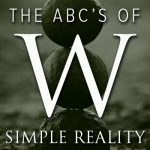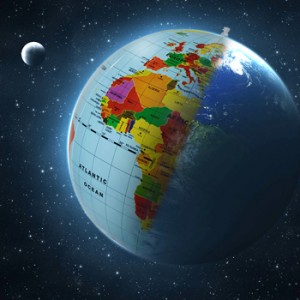 How Our Story Influences Our Experience Of Reality
How Our Story Influences Our Experience Of Reality
Our worldview as individuals or as a collective (nation or global village) is all important. It is that story which determines how the creative energy in each person or collective is expressed. The energy that fuels the universe in and of itself is neutral. But the dominant narrative, the context we create, tends to influence whether that energy is expressed in either a predominantly positive or predominantly negative way. If the human story were P-A, we would be compassionate human beings creating heaven on earth. However, since our story is P-B, even though many of us are kind, loving and passionately creative people, the dominant experience is the unsustainable madness that we encounter each and every day.
Obviously, we must begin to have a dialogue about how to change our story, how to shift the paradigm. That dialogue continues in this article around the topic of worldview. Hear what our venerable sages have to say about it. Internalize this perennial wisdom and begin The Point of Power Practice that can alter your experience of life.
A good working definition of worldview would be that it is comprised of beliefs, attitudes and values. To emphasize the importance of at least one of these components we have only to quote Bob Larzelere: “Beliefs completely determine your reality when held as the truth.”[i] It is our worldview that determines whether the energy of a given experience is used to perpetuate suffering or is used for attaining present moment awareness, for waking up.
Seth, channeled by Jane Roberts, is only too glad to affirm this aspect of Simple Reality: “Your social structure, from the largest metropolis to the smallest farm, from the wealthiest areas to the poorest ghettos, from the monasteries to the prisons, reflects the inner situation of the individual self and the personal beliefs that each of you hold.”[ii] Therefore, if humanity is to move from an unsustainable community to a sustainable one, our worldview individually and collectively is where we must begin our process of change.
“Worldviews, and the ways of knowing what produce and sustain them, structure our perceptions and define how we experience ourselves in relation to the Universe. They determine how we relate to each other and to the Earth itself, how we find satisfaction, and how we come to terms with ultimate questions of living and dying. For these reasons, there is no matter of greater significance than which worldview, or paradigm, is ascendant in our society.”[iii]
Amen to that! Our worldview determines our identity, our identity determines our behavior, and our behavior on this planet today needs radical change. 
A worldview such as P-B can be very limiting and suffocating as well as self-destructive, as psychologist C. G. Jung was well aware. “But all those contents that refuse to fit into this whole are either overlooked and forgotten or repressed and denied.”[iv] The content of our life’s experience that is repressed ends up in the shadow and the denied portion haunts us in our dreams because the energy that underlies our story (P-B) is fear.
Humanity today tends to mistakenly think that we have made progress throughout history, particularly since the Industrial Revolution. That “progress” is very shallow and based on illusion. Our hubris is unjustified as Jung again reminds us. “Thus through what sociologist Levy-Bruhl has termed the ‘participation mystique,’ primitive man is contained physically and psychically in his world. In contrast, civilized man believes that he is separate from nature and in possession of an individual soul. Thus modern man must deprive nature of psychic reality and, in order to see his world objectively, deny all his archaic projections.”[v] Jung has reminded us of two profound principles that are foundational to a healthy worldview founded on Oneness. First, we are not separate from nature, or anything else for that matter, since all of creation is interdependent and interrelated. Second, there is no separate ego, no “I” or “me.”
“But today,” says Carter Phipps, “we know that the defining characteristics of our postmodern age, an era that was being born even as Jung lay dying, are its lack of a coherent worldview and its hostility toward any larger vision or ‘metanarrative’ that could help unify our society and give us the energy and perspective to respond to the problems and potentials of our time in history; a powerful coherent worldview that can allow us to thrive in a complex, globalizing, rapidly changing planetary culture.”[vi]
Phipps continues describing the contributions of the mystic and Jesuit priest, Pierre Teilhard de Chardin, which support our basic contentions concerning the importance of our worldview: “Our concepts and beliefs about life and reality, what he called our a priori convictions, tend to condition our experience. Indeed, these convictions help form powerful interpretive frameworks, worldviews that reflect our deepest conclusions about the nature of ourselves and the Universe we live in. And because these worldviews are so primary, so fundamental, they affect everything else—how we think about family, community, politics, economics, religion, even spiritual experience.”[vii]
We have talked about the belief portion of the worldview. What about values? Rollo May addresses values in his book Man’s Search for Himself: “The belief in individual competition [seeking power] and reason [the intellect] we have been discussing are the ones which in actuality have guided modern Western development, and are not necessarily the ideal values.”[viii]
May seems to feel that without the anchor of P-A, human beings have been aimlessly drifting at sea: “Man’s anxiety, bewilderment and emptiness—the chronic psychic diseases of modern man—occur mainly because his values are confused and contradictory, and he has no psychic core.”[ix] Clearly, if we continue to depend on the beliefs and values of P-B, we are in serious trouble.
Just as a worldview explains the suffering of an individual, it also explains the experience of families, tribes and nations. A nation’s P-B worldview is a myth specifically constructed to prevent a paradigm shift. “The Epic of Gilgamesh belongs to that group of Ancient Near Eastern myths which may be termed ‘societal.’ Each nation has its societal myth to justify and sustain functions: to validate prevailing social patterns, to provide rules and acceptable models for living, to supply divine sanction for the existing power structure, and to prove to the individual that the laws and customs of his country were superior to those of other countries. Thus the myth served the purpose of preserving the status quo.”[x]
It is that status quo, that worldview, that story (P-B) which we must challenge and resist with every ounce of energy within us, and at the same time become advocates for a new narrative that nurtures our deepest yearnings for freedom, joy, happiness, compassion and peace.
[i] Larzelere, Bob. The Harmony of Love. San Francisco: Context Publications, 1982, p. 67.
[ii] Roberts, Jane. The Nature of Personal Reality. New York: Bantam, 1974, p. 356.
[iii] Mack, John E. “The 2008 Shift Report.” Shift: At the Frontier of Consciousness. Petaluma, California: Institute of Noetic Sciences, March-May 2008, p. 35.
[iv] Jung, C. G. The Portable Jung. New York: Penguin Books, 1971, p. 105.
[v] Jung, C. G. Abstracts of the Collected Works of C. G. Jung. Rockville, Maryland: NIMH, 1978, p. 63.
[vi] Phipps, Carter. “The cosmos, the psyche and You.” What is Enlightenment? Lennox, Massachusetts, February/April 2008, p. 56.
[vii] Ibid., p. 62.
[viii] May, Rollo. Man’s Search For Himself. New York: Norton 1953, p. 45.
[ix] Ibid., p. 152.
[x] Magill, Frank N. [ed.]. Masterpieces of World Literature. New York: Harper, 1989, p. 250.


